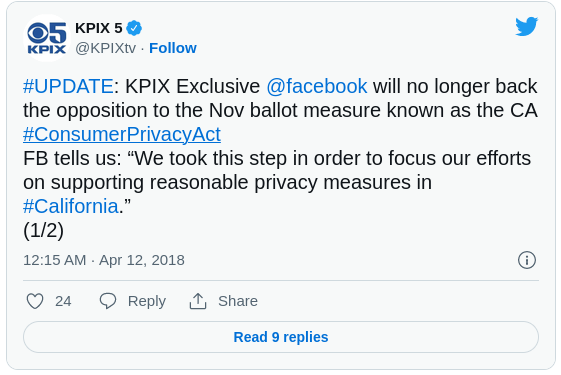Public Attention Forces Facebook To Retreat From Anti-Privacy Alliance With ISPs In California
Fri, Apr 13th 2018 01:51pm – Karl Bode
Silicon Valley companies have historically not seen eye to eye with giant ISPs, as we saw during the early years of the net neutrality debate. But Google and Facebook recently put aside their differences and joined forces with Comcast, AT&T and Verizon to successfully kill an attempt to impose some fairly-modest privacy standards in California. California’s proposal closely mirrored the FCC privacy rules ISPs lobbied the GOP and Trump administration to kill last year. Those rules simply required that companies clearly outline what data is collected and sold, and provide working opt out tools.
As the EFF noted at the time, sidelining this proposed law required a lot of lying on the behalf of Facebook and Comcast, including claims that the modest protections would harm children, prevent law enforcement from doing its job (not true), reduce consumer security, increase internet popups (what?) and even somehow “embolden extremism.” It’s pretty clear lobbyists didn’t have much problem exploiting the (then) recent tragedy in Charlottesville to their tactical advantage, notes the EFF:
“One of the most offensive aspects of the misinformation campaign was the claim that pretending to restore our privacy rights, which have been on the books for communications providers for years, would help extremism. Here is the excerpt from an anonymous and fact-free document the industry put directly into the hands of state senators to stall the bill:
The bill would bar ISPs from sharing potentially identifiable information with law enforcement in many circumstances. For example, a threat to conduct a terror attack could not be shared (unless it was to protect the ISP, its users, or other ISPs from fraudulent, abusive, or unlawful use of the ISP’s service). AND the bill instructs that all such exceptions are to be construed narrowly.
In addition to national security scaremongering, the industry put out a second document that attempted to play off fears emerging from the recent Charlottesville attack by white supremacists:
“This would mean that ISPs who inadvertently learned of a rightwing extremist or other violent threat to the public at large could not share that information with law enforcement without customer approval. Even IP address of bad actor [sic] could not be shared.”
While ISPs, Google and Facebook successfully managed to stall that bill, a new citizen petition has emerged in its shadow. Dubbed the California Privacy Act, the proposal again focuses largely on transparency, requiring that ISPs and content companies alike disclose precisely what data is being collected and sold, while providing working opt out tools. This new proposal should show up as a ballot initiative in November. In some ways it goes further than the earlier proposal, but in other ways it’s less comprehensive (“The ISP privacy bill regulates use, sale, and disclosure of cable and telephone. The initiative goes at sale and disclosure of everyone (tech and ISP) but leaves use untouched,” the EFF tells me).
Needless to say, with everybody suddenly at least pretending to care about privacy for a little while in the wake of the Cambridge Analytica scandal and Zuckerberg’s testimony before Congress, Facebook was forced to quietly retreat from its opposition to the measure:

Except again, Facebook has consistently fought reasonable privacy measures in California. Backers of the proposal were quick to issue a statement applauding Facebook’s retreat, while noting that AT&T, Verizon, Comcast and Google continue to battle the proposal:
“We believe that all consumers deserve the basic rights outlined in our initiative. We call on the remaining corporations who have contributed to the Super PAC opposing this common-sense measure to drop their opposition. Google, AT&T, Verizon & Comcast: if you are not selling our personal information, why are you spending a million dollars to oppose us? Voters overwhelmingly support this measure, and protecting consumers is not only a good business decision, but the right thing to do. It?s time to stop business as usual and to step up and do the right thing.”
Of course we’ll see if Facebook’s opposition persists once the spotlight fades. Facebook had already donated $200,000 to the “Committee to Protect California Jobs” in the hopes of keeping the initiative off the ballot, with matching support from AT&T, Google, Comcast and Verizon. That committee remains very much active in its opposition:
“Steven Maviglio, the spokesperson for the Committee to Protect California Jobs, contends that Facebook still considers the proposed bill to be ?flawed.? In an emailed statement, he told Gizmodo, ?It is unsurprising that proponents of the so-called ?California Consumer Privacy Act? are looking to distract from their deeply flawed initiative that will do enormous harm to the California economy while not protecting anyone?s privacy.”
Obviously legislation will play at least some role in addressing the deep well of privacy dysfunction that ranges from your broadband connection to your IOT gadgets. It should be fairly apparent these industry giants aren’t likely to support even the most modest of proposals without a fight. An informed and empowered consumer is simply more likely to opt out of data monetization schemes, reducing overall revenues. And as we stumble forward, many of these companies are already proposing their own bogus legislative “solutions” that could make things worse.
People spent much of this week pearl clutching over privacy, but it’s a very small fraction of those folks that actually pay attention to the nuts and bolts policy efforts to actually do something about it, especially on the state level. That’s going to need to change. Privacy legislation is coming, and the public can either choose to be a part of its construction, or cede that responsibility to industry giants intent on crafting incomplete or potentially harmful “solutions.”